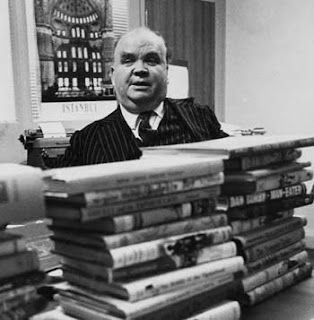Enemies of Promise
 There are many things worth reading in the new issue of The Quarterly Conversation (I have a review in it, so this is kind of a self-plug), but I was particularly taken with an essay by Jeremy Hatch on Cyril Connolly's Enemies of Promise. I was planning to read the book at some point, so (maybe) expect further coverage, but for now, there are two things about Hatch's essay that I want to pull out.
There are many things worth reading in the new issue of The Quarterly Conversation (I have a review in it, so this is kind of a self-plug), but I was particularly taken with an essay by Jeremy Hatch on Cyril Connolly's Enemies of Promise. I was planning to read the book at some point, so (maybe) expect further coverage, but for now, there are two things about Hatch's essay that I want to pull out.First, Hatch isolates the following quote, which I found very interesting.
In spite of the slow conversion of progressive ideas into the fact of history, the Dark Ages have a way of coming back. Civilization—the world of affection and reason and freedom and justice—is a luxury which must be fought for, as dangerous to possess as an oil-field or an unlucky diamond.This is an extraordinary statement: Connolly is here both anticipating the post-colonial argument that being rich in resources was actually the greatest historical tragedy for African, Asian, and Latin American lands because wherever there were resources to be exploited, the Europeans—and later the Americans—came to take them (the basic thesis of Eduardo Galeano's Open Veins of Latin America), and he's also reversing that argument, turning civilization itself into a natural resource which attracts forces of degeneration and atavism like ill luck to a cursed jewel. The whole process of empire-building, conquest and exploitation becomes a strategy for preventing that natural resource from either falling into the wrong hands or being otherwise ill-used by unappreciative, uncivilized peoples. Wow. The parallels to neoconservative "democracy" should be apparent, so I won't develop that here.
But Hatch found a lot of good in Connolly, and I am intrigued by him, and by this book. The idea of organizing one's thoughts on the factors and influences which are deforming or impeding on turning one's "promise" (or "talent" or "potential" or "aptitude" as we might now call it) into concrete success is a project that sounds like it would be worthwhile for anyone to pursue (although I have my doubts that after doing so I would still find it as worthwhile—I probably would have written only, "blog less, read more," which as you can see by the recent dearth of posts, I've been trying to do). And Hatch himself updates Connolly's analysis for the blog era, focusing on the conditions that have changed since 1938 and how those changes might function either as an enemy or as a friend of promise, and how they've altered what it means to have "promise" in the first place.
Hatch's questions mostly focus on very high-level, one might almost say abstract, developments in the structure of literary production and recognition—how people get to the point where they're trying to turn their promise into practice, and how what comes out of that practice becomes known as something that has confirmed the presence of promise. (That alliteration is godawful, I know, and I swear not intentional.)
I kind of hope that Connolly's book isn't abstract after this fashion (it doesn't sound like it is); I am much more attracted to works, like Keats's letters or Henry Adams's Education, which can be said to analyze this question of promise on the level of individual choices and even temperament. I think this is the better way of going about answering these questions: the idea of "promise" calls for the individual, and not the general, case.
Comments
http://www.poets.org/viewmedia.php/prmMID/15546